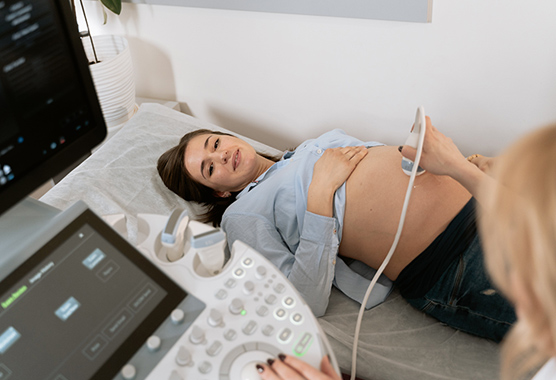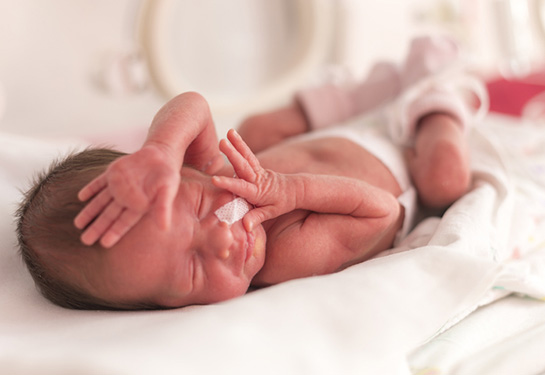Fetal Care and Treatment
Treating a condition before birth can improve your baby’s future. Learn more about our innovative approach to fetal care.
Medically reviewed on June 05, 2023.

Life-Saving Fetal Care for Our Smallest Patients
Learning your unborn child’s health is at risk can be overwhelming for you and your family. At UC Davis Health, we want you to know that advances in modern medicine can change the outlook for many fetal conditions.
Our Fetal Care and Treatment Center provides the full range of advanced services for you and your baby. From diagnostic testing to leading-edge treatments, our highly skilled and caring teams give you and your baby the best care possible.
Our Difference
Multispecialty Team
Our multispecialty teams have one goal — to protect the health of you and your child. Our fetal medicine physicians work closely with maternal specialists (who focus on you) and neonatal experts (who care for your newborn). Our team also includes nurse coordinators, genetic counselors and social workers who provide you and your loved ones with guidance and support.
Pioneering Research
Our scientists push the boundaries of fetal medicine with groundbreaking research. We are home to a world-renowned clinical trial of a promising new spina bifida treatment. The CuRe trial offers a new approach that combines stem cell therapy with fetal surgery. Our fetal care patient families find new hope at UC Davis Health.
Compassionate Care
Our fetal care team delivers lifesaving care every day, but they never forget the emotional rollercoaster that a parent can experience. You and your family need kindness and comfort during your pregnancy — and that’s what our team provides. Throughout your care journey, we are by your side as healers, advisors and friends.
What Is Fetal Care?
Fetal conditions — those that occur before birth (in utero) — can cause disability and affect the survival of your child. Our fetal medicine specialists provide expert diagnostic and treatment services, from referral through to delivery.
Types of Fetal Conditions:
Congenital Conditions
Congenital disorders develop during pregnancy. They can affect your baby’s heart, spine, gastrointestinal (GI) tract and other body systems. Congenital conditions we treat include congenital heart disease, congenital diaphragmatic hernia, spina bifida (myelomeningocele) and gastroschisis.
Fetal Complications
Fetal complications are rare but serious conditions that require expert, timely care. For example, hydrops is a buildup of fluid (edema) in your baby’s body that can cause heart distress. Amniotic band syndrome occurs when strands from a ruptured membrane wrap tightly around a body part. Twin-to-twin transfusion syndrome is a rare complication that affects blood circulation in identical twins.
Tumors and Masses
Fetal tumors and masses are typically noncancerous but can grow large. Examples include fetal neck masses, which can interfere with breathing and swallowing, and lower back tumors (sacrococcygeal teratomas). Our physicians perform advanced procedures before, during and after birth to remove these growths.
Fetal Care Services We Offer
Our fetal care center receives referrals from physicians across Northern California and beyond for complex fetal conditions. When you want information and options, diagnostic testing or state-of-the-art treatments, we are here for you.
Our services include:
Physician Consultations
In some cases, you may want advice and guidance from our knowledgeable team. Our physicians let you know what your baby’s diagnosis means and explain all available options. They also work with you to develop plans for delivery and prenatal care.
Genetic Testing and Counseling
If a disease runs in your family (hereditary), genetic testing can find out if you carry the genetic changes (mutations) that may cause the disease. Genetic counseling can help you understand the risk of passing those genes to a child before you become pregnant.
Diagnostic Imaging
Our specially trained radiologists use high-tech imaging tools, such as high-resolution ultrasound and fetal MRI. We also offer fetal echocardiography to diagnose congenital (at birth) heart disease. This sophisticated test creates an ultrasound video of your baby’s heart.
Amniocentesis and Chorionic Villi Sampling (CVS)
Amniocentesis involves taking a small amount of the fluid around your baby (amniotic fluid). In CVS, we collect a sample of the tissue between your baby and uterus (placenta). A laboratory tests the samples for genetic diseases and abnormalities in chromosomes (structures in cells that contain genetic information).
Needle-Based Interventions
We treat some conditions through your abdomen (percutaneously) using ultrasound-guided needles or thin tubes. Using this approach, we can drain excess fluid or give your baby medications or blood transfusions (healthy blood from a donor).
Minimally Invasive Fetal Surgery
We insert a thin flexible instrument (fetoscope) into your uterus and use tiny instruments or lasers to perform surgery. Using a fetoscope, we can cut the strap of tissue in amniotic band syndrome. In twin-to-twin transfusion syndrome, we use a laser to seal off connected blood vessels between the twins.
Open Fetal Surgery
In fetal surgery, we operate through an opening (incision) in your abdomen. Surgery is the main treatment for spina bifida (with stem cells, as part of our innovative clinical trial). UC Davis Health has one of the most well-respected spina bifida clinics in the U.S.
Ex-Utero Intrapartum Treatment (EXIT)
In EXIT, we perform a cesarean section (C-section) but keep your baby connected to you through the umbilical cord and placenta. We use this method to treat fetal conditions such as neck masses and congenital diaphragmatic hernia.
"Data & Statistics on Birth Defects," Centers for Disease Control and Prevention (CDC), https://www.cdc.gov/ncbddd/birthdefects/data.html
Request an Appointment
As Sacramento's No. 1 hospital, you'll benefit from unique advantages in primary care and specialty care. This includes prevention, diagnosis and treatment options from experts in 150 specialties.
Referring Physicians
To refer a patient, submit an electronic referral form or call.
800-4-UCDAVIS
Patients
Call to make an appointment.
Consumer Resource Center
800-2-UCDAVIS

Ranked among the nation’s best hospitals
A U.S. News & World Report best hospital in cardiology, heart & vascular surgery, diabetes & endocrinology, ENT, geriatrics, neurology & neurosurgery, and pulmonology & lung surgery.

Ranked among the nation’s best children’s hospitals
U.S. News & World Report ranked UC Davis Children’s Hospital among the best in pediatric nephrology, orthopedics*, and pulmonology & lung surgery. (*Together with Shriners Children’s Northern California)

Ranked Sacramento’s #1 hospital
Ranked Sacramento’s #1 hospital by U.S. News, and high-performing in aortic valve surgery, back surgery (spinal fusion), COPD, colon cancer surgery, diabetes, gynecological cancer surgery, heart arrhythmia, heart failure, kidney failure, leukemia, lymphoma & myeloma, lung cancer surgery, pacemaker implantation, pneumonia, prostate cancer surgery, stroke, TAVR, cancer, orthopedics, gastroenterology & GI surgery, and urology.

The nation’s highest nursing honor
UC Davis Medical Center has received Magnet® recognition, the nation’s highest honor for nursing excellence.

World-class cancer care
One of ~59 U.S. cancer centers designated “comprehensive” by the National Cancer Institute.

A leader in health care equality
For the 13th consecutive year, UC Davis Medical Center has been recognized as an LGBTQ+ Healthcare Equality Leader by the educational arm of America’s largest civil rights organization.

